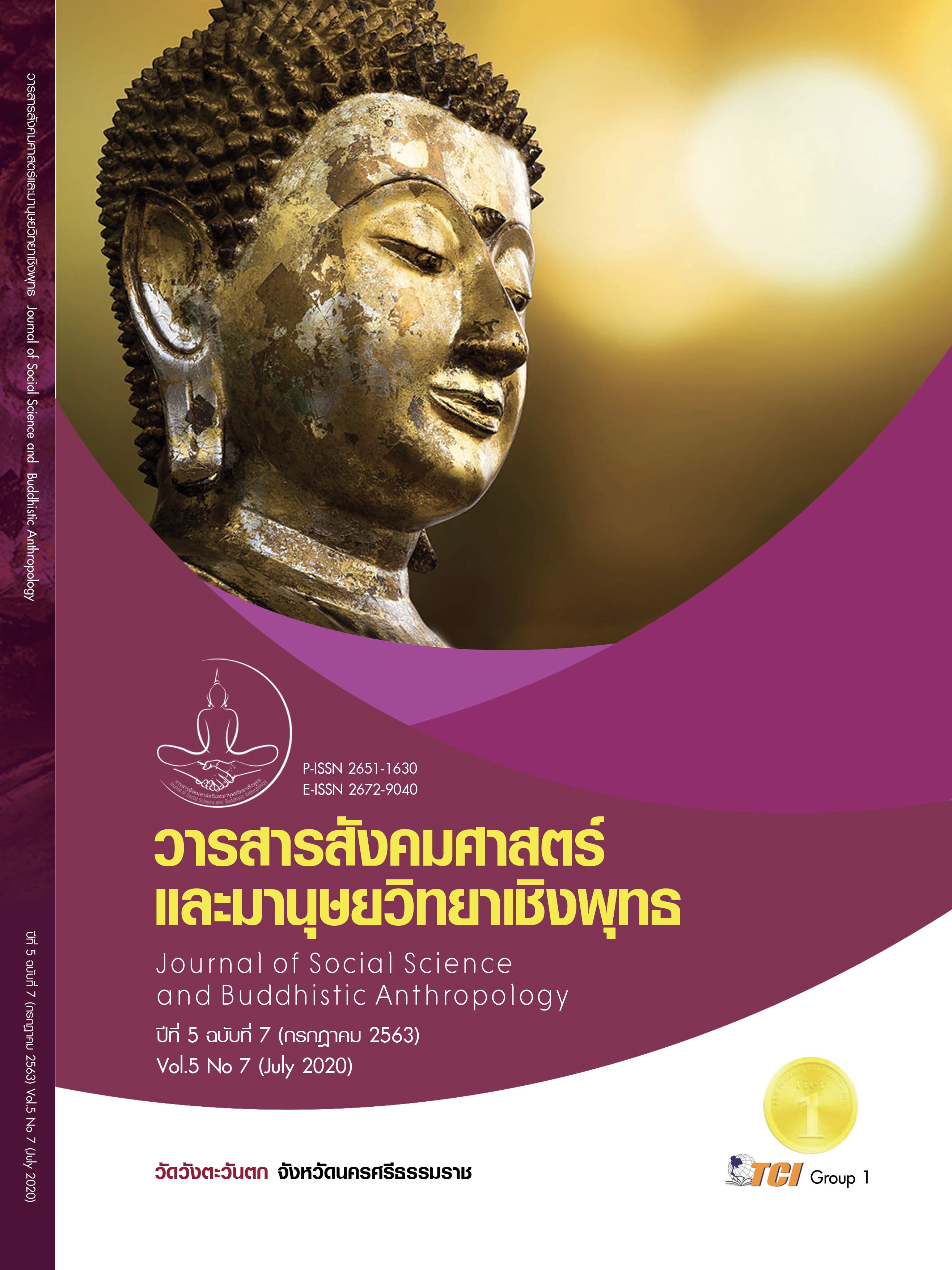EFFECTIVENESS OF TRANSFORMATIONAL LEADERSHIP ENHANCEMENT PROGRAM FOR EXECUTIVE BASED ON CONTEMPLATIVE EDUCATION CONCEPT
Keywords:
Transformational Leadership, The Effectiveness of Program, Executive, Office of Police Forensic Science, Contemplative EducationAbstract
The main objective of this study was to the effectiveness of the transformational leadership enhancement program for the executives under Office of Police Forensic Science based on a contemplative education concept. Simple random sampling method was applied to divide 56 executives into the experimental group and control group, 28 executives in each group. A transformational leadership test with the reliability .92 was used as the research tool. Collected data was analyzed with paired samples, t - test and Multivariate Analysis of Covariance (MANCOVA). Research results illustrated that the executives who implemented the enhancement program had higher transformational leadership than that of the control group, both for after the trial and one month follow up with a statistical significance .05. It implied that the transformational leadership enhancement program for the executives based on a contemplative education concept was effective. From the findings, it was assumed that the enhancement program was effective which helped to improve the transformation leadership of the executives under Office of Police Forensic Science. Therefore, to maintain the transformational leadership, the training on the program should be promoted to the all police officers and the program implementation should be applied to the police officers in other sections by adjusting some content and activities to suit knowledge and experience, and to be consistent with the context of the police officers group.
References
ชลลดา ทองทวี และคณะ. (2551). จิตตปัญญาศึกษา การศึกษาเพื่อพัฒนาความเป็นมนุษย์. ใน การประชุมวิชาการประจำปี 2551 โครงการศูนย์จิตตปัญญาศึกษา. มหาวิทยาลัย มหิดล.
เดชชัย สินเจริญ. (2556). การพัฒนาหลักสูตรการฝึกอบรมเพื่อเสริมสร้างภาวะผู้นำการเปลี่ยนแปลง สำหรับผู้อำนวยการโรงพยาบาลส่งเสริมสุขภาพตำบล. ใน วิทยานิพนธ์ปรัชญาดุษฎีบัณฑิต สาขาวิชาการจัดการเพื่อการพัฒนา. มหาวิทยาลัยราชภัฏราชนครินทร์.
ธนา นิลชัยโกวิทย์. (2551). การเรียนรู้เพื่อการเปลี่ยนแปลงและจิตตปัญญาศึกษา. นครปฐม: มหาวิทยาลัยมหิดล.
ธนา นิลชัยโกวิทย์ และคณะ. (2550). รายงานโครงการวิจัยเพื่อพัฒนาชุดการเรียนรู้การอบรมและกระบวนการด้านจิตตปัญญาศึกษา. นครปฐม: ศูนย์จิตตปัญญาศึกษา มหาวิทยาลัยมหิดล.
นันทภา ปัญญารัตน์. (2555). การพัฒนากระบวนการจัดการเรียนรู้ตามแนวคิดจิตตปัญญาศึกษาเพื่อพัฒนาครูปฐมวัยในโรงเรียนรวม. ใน วิทยานิพนธ์ครุศาสตรดุษฎีบัณฑิต สาขาวิชาการศึกษานอกระบบโรงเรียน. จุฬาลงกรณ์มหาวิทยาลัย.
ปราณี อ่อนศรี และคณะ. (2556). การพัฒนาหลักสูตรฝึกอบรมเพื่อเสริมสร้างคุณลักษณะตามแนวคิดจิตตปัญญาศึกษาสำหรับนิสิตระดับอุดมศึกษา. นครปฐม: ศูนย์จิตตปัญญาศึกษา มหาวิทยาลัยมหิดล.
ผ่องพรรณ ตรัยมงคลกูล และสุภาพ ฉัตราภรณ์. (2555). การออกแบบการวิจัย. กรุงเทพมหานคร: คณะศึกษาศาสตร์ มหาวิทยาลัยเกษตรศาสตร์.
พรทิพย์ ไตรภัทร. (2558). การพัฒนาภาวะผู้นำการเปลี่ยนแปลงของหัวหน้าหน่วยทางการพยาบาลในโรงพยาบาลสังกัดกระทรวงกลาโหมโดยใช้จิตตปัญญาศึกษา. วารสารแพทย์นาวี, 41(1), 17-32.
มานิตา ลีโทชวลิต. (2553). การพัฒนากระบวนการจัดการเรียนรู้ตามแนวคิดจิตตปัญญาศึกษาเพื่อพัฒนาครูปฐมวัยในโรงเรียนรวม. ใน ดุษฎีนิพนธ์ครุศาสตรดุษฎีบัณฑิต สาขาการศึกษาปฐมวัย. จุฬาลงกรณ์มหาวิทยาลัย.
รัตติกรณ์ จงวิศาล. (2543). ผลการฝึกอบรมภาวะผู้นำการเปลี่ยนแปลงของนิสิต มหาวิทยาลัยเกษตรศาสตร์. ใน วิทยานิพนธ์วิทยาศาสตรดุษฎีบัณฑิต สาขาวิชาการวิจัยพฤติกรรมศาสตร์ประยุกต์. มหาวิทยาลัยศรีนครินทร์วิโรฒ.
รัตติกรณ์ จงวิศาล. (2554). มนุษยสัมพันธ์: พฤติกรรมมนุษย์ในองค์กร. กรุงเทพมหานคร: สำนักพิมพ์มหาวิทยาลัยเกษตรศาสตร์.
สมสิทธิ์ อัสดรนิธี และกาญจนา ภูครองนาค. (2555). การศึกษาวิเคราะห์ความรู้เกี่ยวกับการเรียนรู้สู่การเปลี่ยนแปลง ตามแนวจิตตปัญญาศึกษาเพื่อการบ่มเพาะความซื่อตรง. วารสารวิชาการศึกษาศาสตร์, 18(2), 225-242.
สุพจน์ แสงเงิน. (2550). การพัฒนาหลักสูตรการฝึกอบรมเพื่อเสริมสร้างความเป็นผู้นำ สำหรับสมาชิกองค์การบริหารส่วนตำบลจังหวัดนนทบุรี. ใน ดุษฎีนิพนธ์ปรัชญาดุษฎีบัณฑิต สาขาวิชาการศึกษาเพื่อการพัฒนาท้องถิ่น. มหาวิทยาลัยราชภัฏราชนครินทร์.
สุมน อมรวิวัฒน์. (2549). บทบาทของสถาบันการศึกษาต่อการพัฒนาจิตใจ. กรุงเทพมหานคร: เจริญผล.
หฤทัย อนุสสรราชกิจ และศิรประภา พฤทธิกุล. (2553). การพัฒนากระบวนการเรียนรู้ตามแนวคิดจิตตปัญญาศึกษาสำหรับครูปฐมวัยในเขตภาคตะวันออก. จันทบุรี: มหาวิทยาลัยราชภัฏรำไพพรรณี.
Anuroj, K. (2014). Leadership: Tips for Successful Sustainable Development. Royal Thai Air Force Medical Gazette, 60(3), 53-56.
Mohsen, A. & Mohammad, R.D. (2011). Considering Transformational Leadership Model in Branches of Tehran Social Security Organization. Social and Behavioral Sciences, 15, 3131-3137.
Romano, D. (2014). Leading at the edge of uncertainty: An exploration of the effect of contemplative practice on organizational leaders.Retrieved 28 January 2020 จาก https://aura.antioch.edu/cgi/viewcontent.cgi?article=1081&context=etds
Rosaline S. Barbour & Kitzinger, J.. (1999). Developing Focus Group Research Politics, Theory and Practice. London: Sage Publications Limited.
Steve, N. (2011). Preparing Our Leaders For The Future. Strategic HR Review, 11(1), 5–12.
Trimble, S. W. (2004). Contemplative leadership in the workplace: A process and its implications for project management. Ohio: Union Institute & University.









